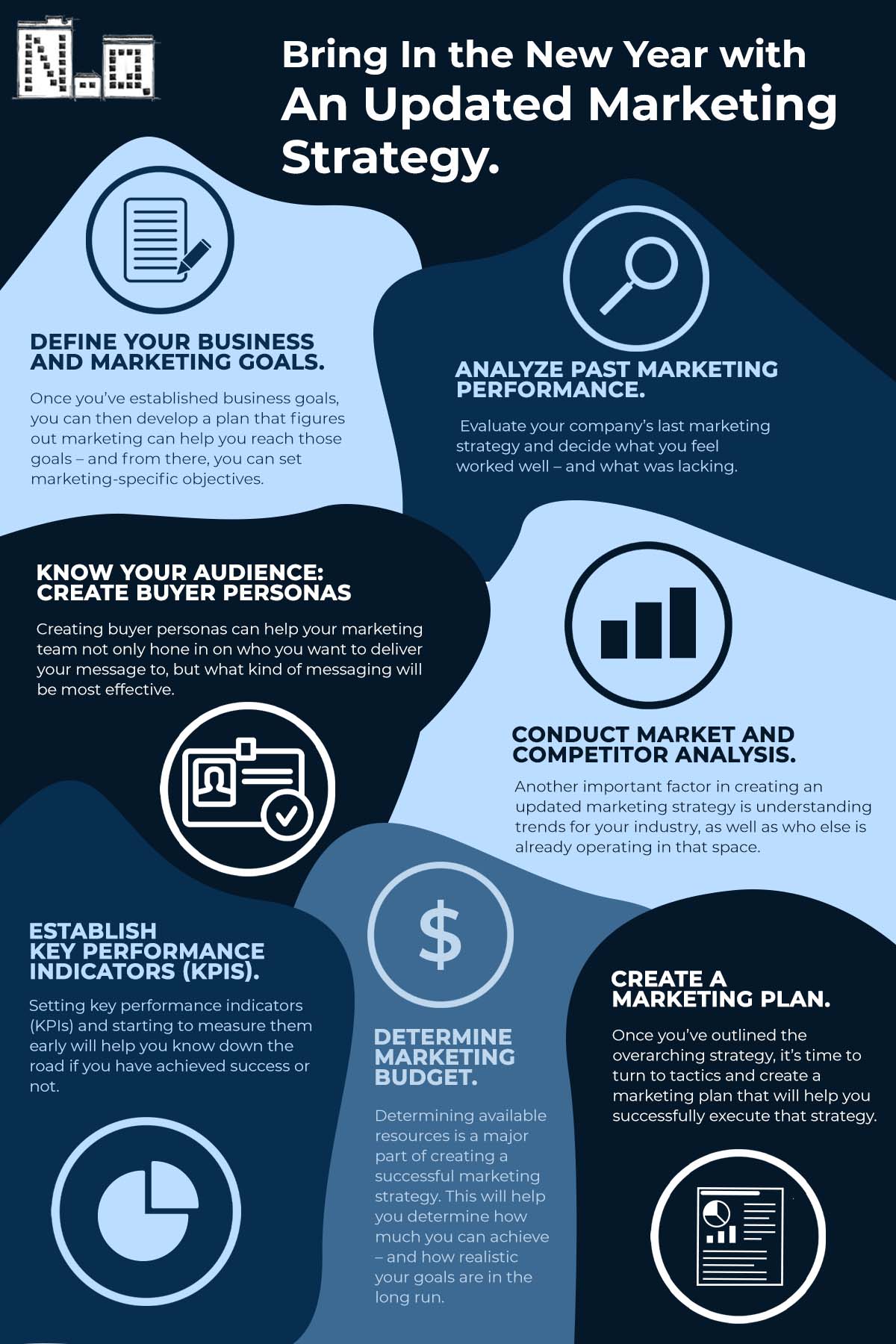Bring In the New Year with an Updated Marketing Strategy
A good marketing strategy can really drive your business forward – but with constant shifts in consumer behavior and ongoing developments in tech, social and individual industries, all marketing strategies need updating on a regular basis.
If you’re looking to make a few changes to better promote your company’s products and services, here are several steps to crafting an updated marketing strategy for 2023.
Define your business and marketing goals.
The best place to start is often at the end – what are your business goals for the year? In order to map out a successful plan, you need to start by first defining what success will look like for your company. Once you’ve established business goals, you can then develop a plan that figures out marketing can help you reach those goals – and from there, you can set marketing-specific objectives.
Whether for business or marketing, be sure to set SMART goals, which means goals that are specific, measurable, achievable, relevant and timely.
Analyze past marketing performance.
When moving forward into a new year and updated marketing strategy, it’s also helpful to look at the past. Evaluate your company’s last marketing strategy and decide what you feel worked well – and what was lacking. Just because something worked well in the past doesn’t necessarily mean you will want to carry it over to your new marketing strategy, but it can be a helpful starting point.
Know your audience: Create buyer personas
Part of creating a strong marketing strategy is having a strong understanding of who your audience is. It’s hard to sell a product or services when you don’t have a clear vision of who you are selling to in the first place. As part of establishing your audience, create buyer personas for the top target groups. Buyer personas take into account demographic information such as age, gender, location, income and so on, but also psychological components. Ask yourself what are each persona’s pain points – and how can your products or services cater to those? Creating buyer personas can help your marketing team not only hone in on who you want to deliver your message to, but what kind of messaging will be most effective.
Conduct market and competitor analysis.
Another important factor in creating an updated marketing strategy is understanding trends for your industry, as well as who else is already operating in that space. Maybe a new competitor recently entered the industry – or an established competitor is trying new tactics, experiencing great success and has taken over a larger share of the market. Understanding who else is operating in your industry will help you get a better “lay of the land” when it comes to developing a well-rounded marketing strategy.
Establish key performance indicators (KPIs).
If you’re creating SMART goals for your marketing strategy, you’ll be focused on objectives that are measurable – which means you will also need to define which metrics you will use to measure success. The key performance indicators (KPIs) you select will in large part be determined by your marketing objectives. If you’re looking to gain new customers, for example, you will likely want to take a look at how many marketing qualified leads (MQLs) your strategy is generating. Focused on brand awareness? Social-focused KPIs will probably help guide your strategy. Want to drive more traffic to your website? Look at organic search traffic and rankings. Setting key performance indicators (KPIs) and starting to measure them early will help you know down the road if you have achieved success or not.
Determine marketing budget.
Determining available resources is a major part of creating a successful marketing strategy. As part of that process, you will need to have a solid grasp on what your marketing department’s budget is. This will help you determine how much you can achieve – and how realistic your goals are in the long run.
Create a marketing plan.
Once you’ve outlined the overarching strategy, it’s time to turn to tactics and create a marketing plan that will help you successfully execute that strategy.
Select top channels. As you start to craft your marketing plan for the year, you’ll want to start by selecting which channels to focus on for your marketing efforts. Not all channels will be appropriate for your brand, and spreading your efforts across too many channels can undermine your strategy if you don’t have the resources to consistently cover them all.
If you’ve done the legwork to define your target audience, narrowing your channel selection down will be much easier. For example, if your target audience includes older demographics, TikTok is not going to be the social platform for you.
Create a content calendar and distribution plan. If your updated marketing strategy relies heavily on inbound marketing, a major part of outlining your marketing plan will also be setting and executing a content calendar and distribution plan. How often will you generate new content? Where will you share it? Who will be generating the content and how often can they turn around a new piece? These are all good questions to ask yourself when generating a content plan.
Want someone else to craft a marketing strategy for you? No to the Quo has you covered.
Crafting a well-rounded marketing strategy can be daunting at times. With so many facets to consider and plans to execute, we know it’s easy to feel overwhelmed when it comes to promoting your business. Don’t want to go it alone? You don’t have to. No to the Quo is here to help! In our free strategy session, we’ll talk through your business and goals, and help you devise an updated marketing strategy to meet those goals – no strings attached. Contact us today to schedule your free consultation.

Digital Marketing No To The Quo



